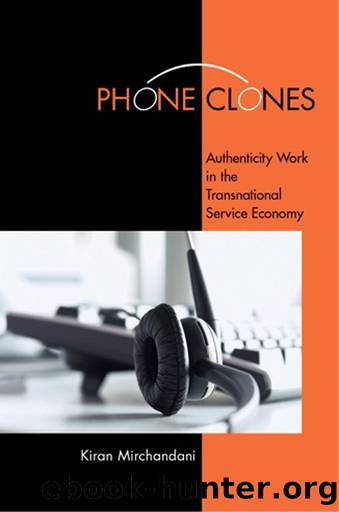Phone Clones by Kiran Mirchandani

Author:Kiran Mirchandani [Mirchandani, Kiran]
Language: eng
Format: epub
Tags: Social Science, Sociology, General, Business & Economics, Labor, Political Science, Globalization
ISBN: 9780801464140
Google: Uf2tDwAAQBAJ
Publisher: Cornell University Press
Published: 2012-04-17T04:27:37+00:00
Consuming Work as Fun
There are two ways in which consumerism structures customer service workersâ experiences. First, workers often self-brand and brand one another as Indiaâs new middle class recognizable by their patterns of consumption. Second, their work is itself packaged as âfunâ in order to be consumed alongside parties and games. These strategies facilitate the continual inscription of Western professionalism as modern and progressive. Workers do not unanimously endorse this link between work and fun, and many draw attention to the construction of work as fun as having discursive power to highlight as well as mask aspects of their jobs. They do this, however, by reifying the assumed connection between the West and the culture of fun and argue instead for recognition of Indian traditions and cultures. In this way, the professionalism enacted through construction of work as fun serves as another arena where the dichotomy between the progressive West and backward India is brought to life.
Call center workers are part of Indiaâs new middle class, which is a social group defined primarily by its practices of consumption that mirror Western consumer culture.39 New middle-class lifestyles are characterized by the focus on leisure and service activities such as restaurants and nightclubs. As Mathangi Krishnamurthy summarizes, âthe call center is . . . the site where a simultaneous construction of the two interlocking figures of producer and consumer is taking place.â40 This link between production and consumption is more pronounced than in most other occupations in India given that a majority of call center workers are young, and many are reputed to spend a high percentage of their incomes on entertainment and leisure. One worker highlights the consumption power of many call center workers by saying that they âcan spend a very lavish life, luxurious and chill out in every pub in the weekends and have couple of drinks, can go on for dates.â
As discussed in the beginning of this chapter, call center workers are marketed by the Indian media and business elite as an ideal transnational workforce because they âwear this brandâ of the consumer worker on a daily basis. Wearing a brand takes work because employees have to maintain âdaily practice at expressing the brandâs conceptual attributes,â41 and this affects how they experience their jobs as well as conceptualize themselves. One worker describes his social life: â[I] go out for parties, chill out, go for movies. It is good earning and spending. Earnings of five days and spending on the weekends. It is U.S. culture, I would say.â Ideal workers are expected to have âan amiable personality, a childish playfulness, a happy-go-lucky frame of mind and an extroverted and carefree demeanor.â42 This juxtaposition of earning and spending is seen both as characteristic of U.S. culture and as related to professionalism. As one agent notes, âIt is cool; we donât feel like getting out of there because one of the things is that you are working with the very young crowd and you are part of it, who has just passed out of the college, and the people who have same thoughts, you are working with them.
Download
This site does not store any files on its server. We only index and link to content provided by other sites. Please contact the content providers to delete copyright contents if any and email us, we'll remove relevant links or contents immediately.
Harry Potter and the Goblet Of Fire by J.K. Rowling(3046)
Never by Ken Follett(2881)
Shadow of Night by Deborah Harkness(2718)
Ogilvy on Advertising by David Ogilvy(2682)
Zero to IPO: Over $1 Trillion of Actionable Advice from the World's Most Successful Entrepreneurs by Frederic Kerrest(2396)
The Man Who Died Twice by Richard Osman(2300)
Machine Learning at Scale with H2O by Gregory Keys | David Whiting(2291)
Book of Life by Deborah Harkness(2263)
How Proust Can Change Your Life by Alain De Botton(2261)
My Brilliant Friend by Elena Ferrante(2224)
0041152001443424520 .pdf by Unknown(2220)
The Tipping Point by Malcolm Gladwell(2204)
How to Pay Zero Taxes, 2018 by Jeff A. Schnepper(2100)
Will by Will Smith(2042)
Purple Hibiscus by Chimamanda Ngozi Adichie(1982)
Hooked: A Dark, Contemporary Romance (Never After Series) by Emily McIntire(1959)
Borders by unknow(1785)
Rationality by Steven Pinker(1765)
Daughter of Smoke and Bone by Laini Taylor(1744)
